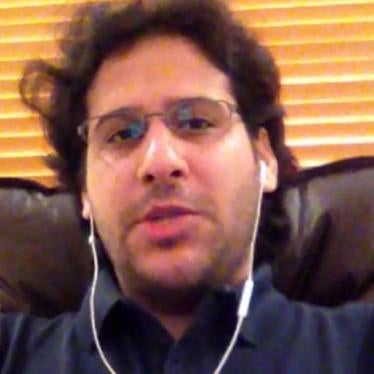In a letter sent to Attorney General Janet Reno, Human Rights Watch urges the Department of Justice to make clear that the U.S. will not consider extraditing or deporting Hani `Abd al Rahim Hussein Sayegh to Saudi Arabia, where he would be at risk of torture and execution.
Sayegh, a Saudi national, was extradited to the U.S. from Canada on the basis of allegations that he was involved in the June 1996 bombing of a U.S. military barracks in Saudi Arabia. The U.S. has now moved to dismiss charges against Sayegh for lack of evidence, and the Justice Department has said it would "respond appropriately" to Saudi Arabia's request for extradition.
"Human Rights Watch strongly believes that Saudi Arabia's human rights record should rule out any consideration of extraditing or deporting Sayegh to that country," Executive Director Kenneth Roth wrote to Reno, citing that country's absence of basic due process rights and regular use of torture to secure confessions. Roth also expressed alarm that U.S. officials have voiced readiness to use the threat of deportation to Saudi Arabia to coerce Sayegh's cooperation.
A copy of the letter follows.
September 10, 1997
Attorney General Janet Reno
Department of Justice
Washington, DC
by facsimile: 514 4371
Dear Attorney General Reno,
We are writing you with regard to the case of Hani Abd al-Rahim Hussein Sayegh, a Saudi national who was extradited to the United States in June, from Canada, in connection with his alleged involvement in attacks or planned attacks against U.S. military personnel in Saudi Arabia. The Justice Department announced on September 8 that it has moved to dismiss the charges against Sayegh for lack of evidence, and to pursue "immigration removal proceedings" against him. Saudi Arabia, according to State Department officials, has requested Sayegh's extradition to face prosecution there in connection with the June 1996 attack on the Khobar Towers barracks, and the Justice Department has stated that it will "respond appropriately" to this request.
A hearing to rule on the department's motion to dismiss is scheduled for today before the U.S. District Court in Washington, D.C. We urge you or another responsible Department of Justice official to make clear at today's hearing or at the earliest appropriate time that the U.S. government will not consider extraditing or deporting Sayegh to Saudi Arabia given that country's appalling and inexcusable human rights record, particularly its treatment of criminal suspects.
Sayegh has reportedly expressed fear that, as a political dissident and a member of the minority Shi`a Muslim community, he would be subject to torture and abuse in Saudi custody, would not receive a fair trial, and would face execution if convicted. According to press reports, it was on the basis of this fear that he agreed to be extradited from Canada to the United States rather than to Saudi Arabia.
Human Rights Watch strongly believes that Saudi Arabia's human rights record should rule out any consideration of extraditing or deporting Sayegh to that country. Saudi Arabia's legal system sanctions serious violations of basic due process rights guaranteed in international human right law. Human Rights Watch and other international human rights organizations have documented the Saudi authorities' regular use of torture to obtain confessions. In addition, there are no limits on pre-trial detention, detainees have no right of access to lawyers during interrogations and trials, and confessions can be the basis for conviction even when obtained through torture and when no corroborating evidence exists. The Department of State's Country Reports for Human Rights Practices for 1996 acknowledges that the reliance on confessions to convict creates "a situation that repeatedly has led prosecuting authorities to coerce confessions from suspects by threats and abuse,"and that "[t]he legal system is subject to executive and royal family influence."
Detainees accused of "crimes involving national security" do not benefit from even the minor protections provided by Saudi law, and are tried in special closed courts, if they receive trials at all. On May 31, 1996, Saudi Arabia beheaded four suspects in a 1995 bomb attack on the basis of confessions obtained after two months of incommunicado detention, and in December 1996, Saudi national Haytham al-Bahr died in detention, reportedly as a result of torture during questioning about his possible involvement in a Shi`a political movement.
In the light of this record, which is clearly well known to the U.S. government, we are concerned that the extradition of Hani Sayegh to Saudi Arabia would violate the U.S. obligation as a party to the Convention Against Torture and Other Cruel, Inhuman or Degrading Treatment or Punishment, Article 3 of which states, "No State Party shall expel, return ("refouler") or extradite a person to another State where there are substantial grounds for believing that he would be in danger of being subjected to torture."
We also view with alarm press reports suggesting that U.S. officials are once again prepared to use the threat of deportation to Saudi Arabia to coerce Sayegh's cooperation. The Los Angeles Times, citing "legal sources close to the case," reported on September 9 that "Justice Department officials apparently hope the threat of deportation to Saudi Arabia will prompt Sayegh to start cooperating with the U.S. authorities, possibly as part of a new plea agreement."
The paper quotes one of these "sources" as saying, "This is one way of putting pressure on the guy to see if he'll come around to being of assistance to them." Such an exploitation of a credible fear of torture and severe mistreatment is utterly inappropriate.
For these reasons, we urge you to make clear that Saudi Arabia, because if its persistent and serious abuses of fundamental human rights, will not be considered a potential destination in any extradition or deportation hearings against Mr. Sayegh.
Thank you for your attention to this matter. We look forward to your response.
Sincerely,
Kenneth Roth
Executive Director







